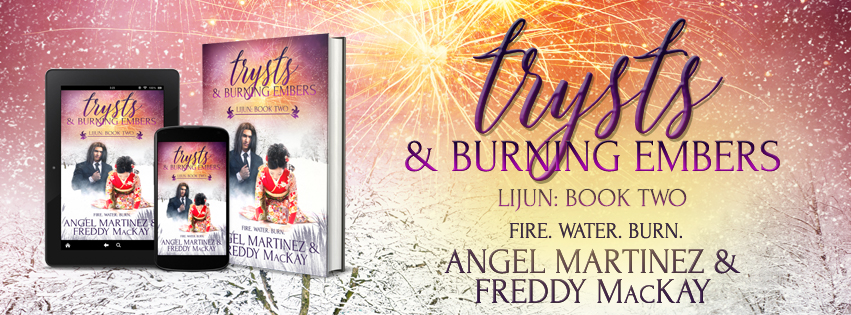
Posted by Claire Siemaszkiewicz on 21st November 2018

Freddy and Angel were recently interviewed for wrotepodcast. You can listen to the interview here: http://www.wrotepodcast.com/angel-martinez/ and/or http://www.wrotepodcast.com/freddy-mackay/
~~~~~~~~~~~~~~~~~~~~~~~~~~~~~~~~~~~~~~~~~~~~~~~~~~~~~~~~~~~~~~~~~~~~~~~~~~~~~~~~~~~~~~~~~~~~~~~~~~~~~~~~~~~~~~~~~~~~~~~~~~~
While abuse is not part of the main relationship dynamic in the Lijun series, it does lurk as an ever-present shadow over Haru. The failure of adults to protect them, those they should have been able to trust growing up, is a huge driver behind their interactions with others as an adult. For children and young people, those in authority, those with power over them most often perpetrate abuse and rape, which colors how they perceive intentions and read meaning into the actions of adults all of their lives.
We've been very cognizant of this with Haru, and have done our best to illustrate the conflicts, external and internal, that they suffer and the conclusions they reach about others' motives. While that would be challenge enough to any new relationship, Haru's situation is further complicated by the old Lijun tradition of contract marriages, and of young people like themselves being groomed from an early age to be bartered off in these exchanges of funds and power. While contract marriages are no longer the rule in Lijun society, they are still common enough, with cultural differences from country to country.
Since Tally walks into this situation seeing it as an agreement between clans rather than the sale of a person, he misses the cues that would have pointed to Haru's childhood trauma and their reactions to people in authority. By the time we catch up with Haru and Tally in the second book, Tally's discovered a good bit and suspects more, but it's taken longer than it should.
A large part of this stems from an abuse victim's relationship with trust – particularly trust of those in authority. Abused children learn that it's not safe to trust. That reaching out and admitting things to people in power is dangerous. That showing certain feelings is likewise dangerous – better to shut down and bury the feeling.
From Brickel and Associates website (Loving a Trauma Survivor):
"It is important to recognize unhealed trauma as a dynamic force in an intimate relationship. It can super-charge emotions, escalate issues, and make it seem impossible to communicate effectively. Issues become complicated by:
While Haru is a fictional character, we've done our best to represent these reactions in a realistic way. Trust is not immediate. Suspicion of and distant behavior with the people who have power over the trauma victim is all too prevalent. "Just talking about it" isn't something that happens readily or easily.
Freddy & Angel

Be the first to receive the latest news and exclusive offers straight to your inbox.